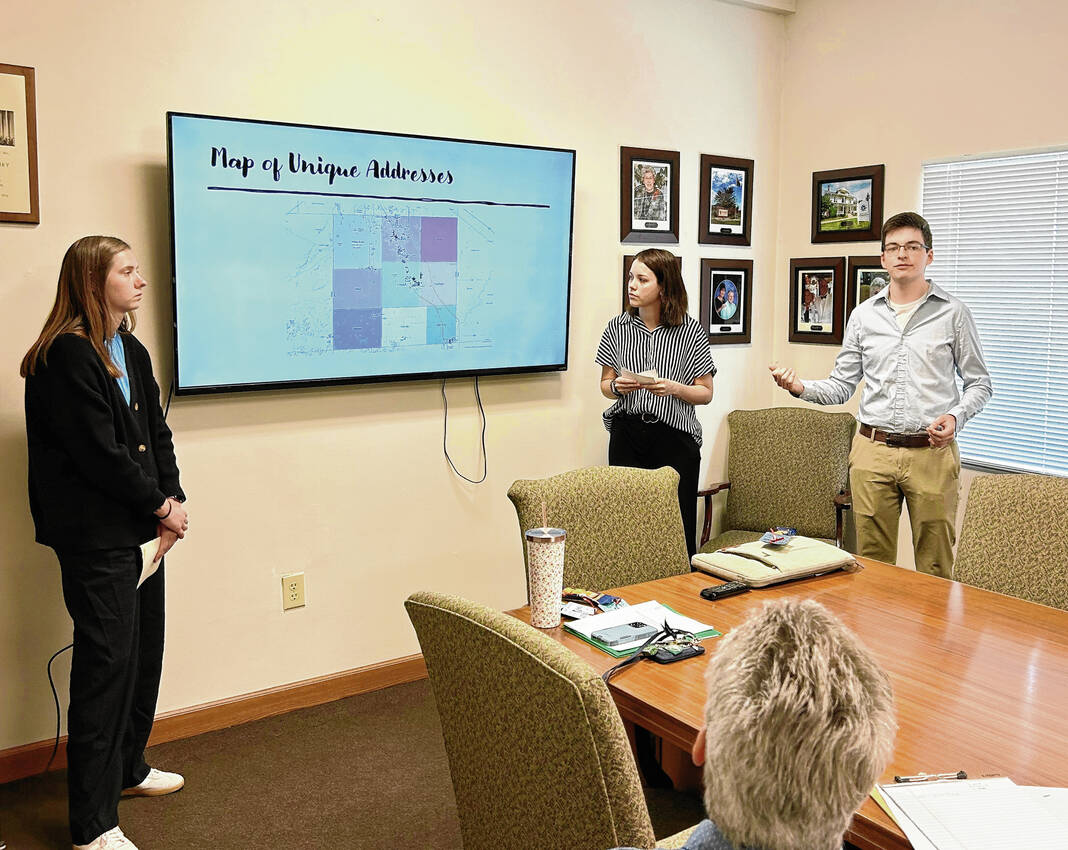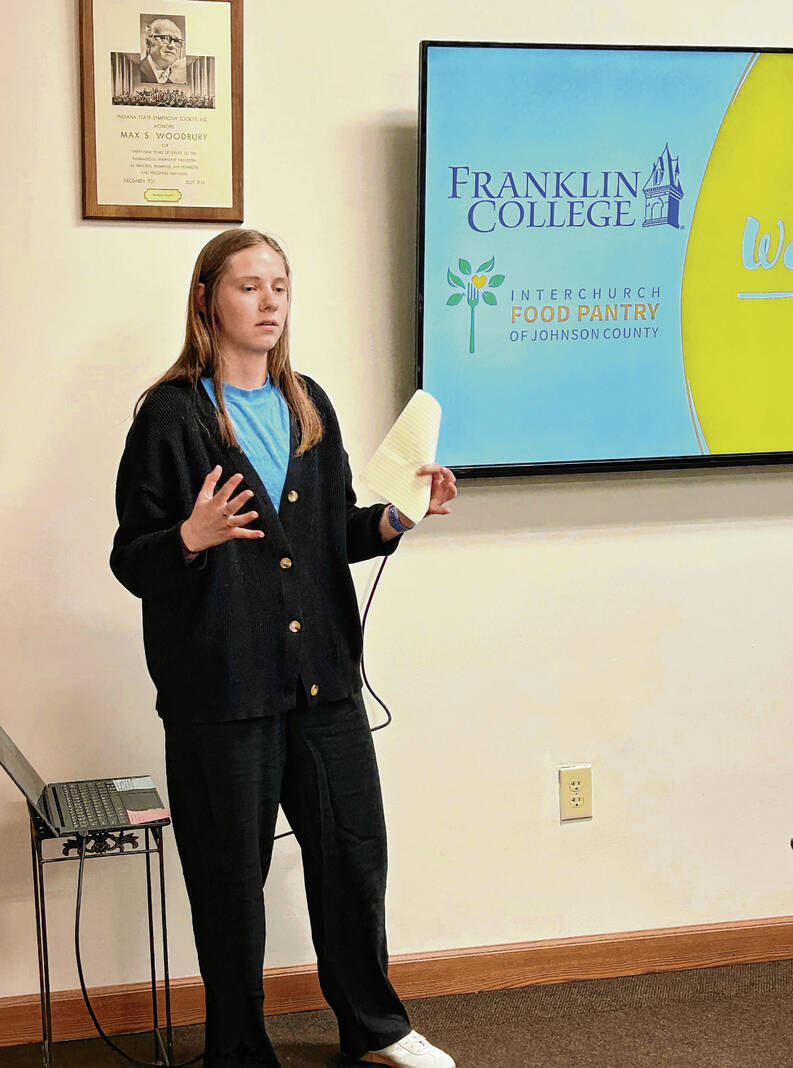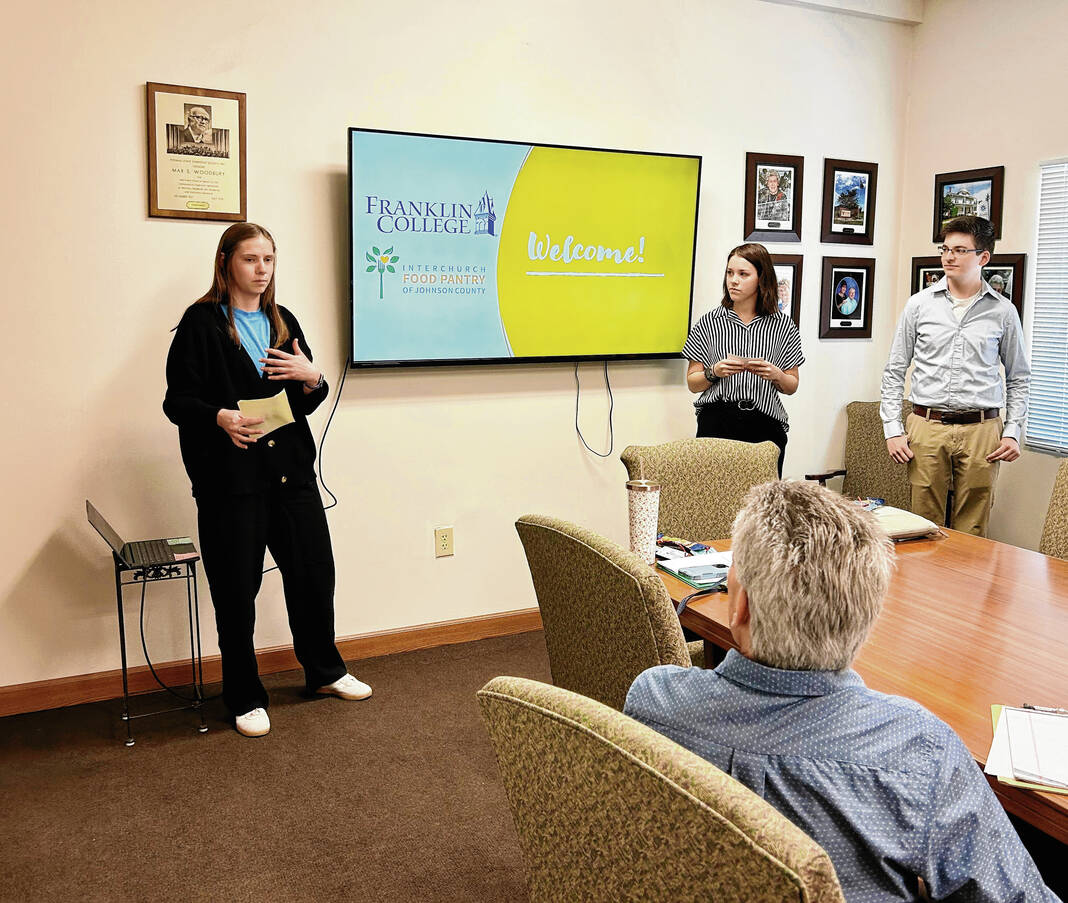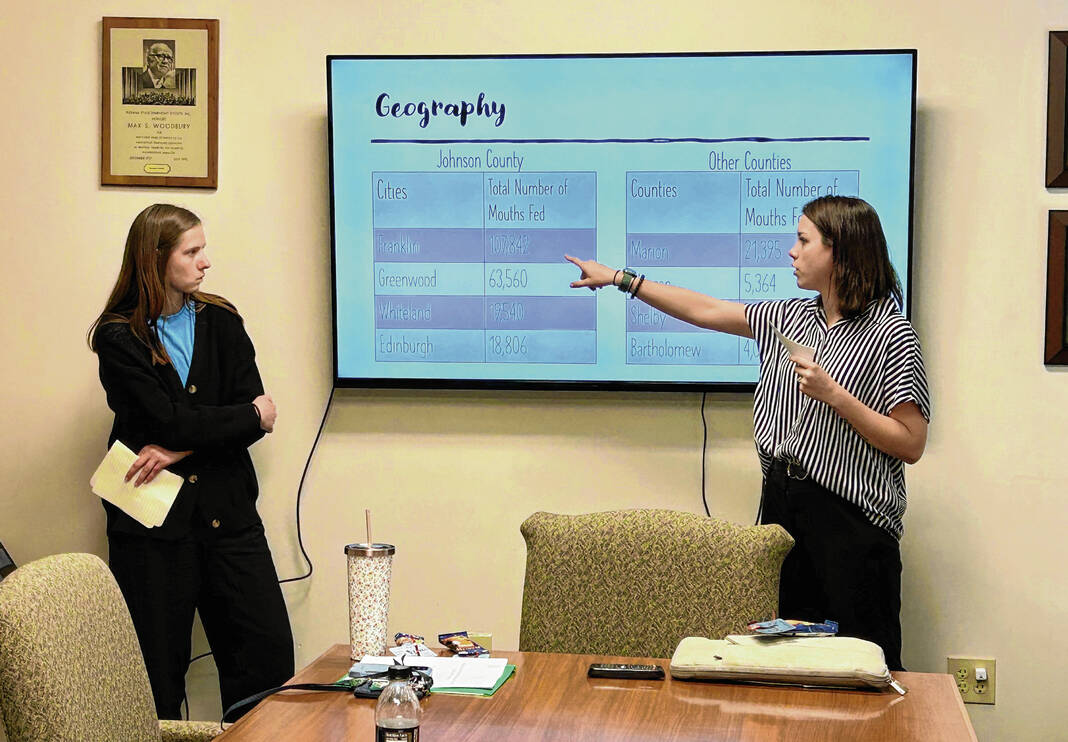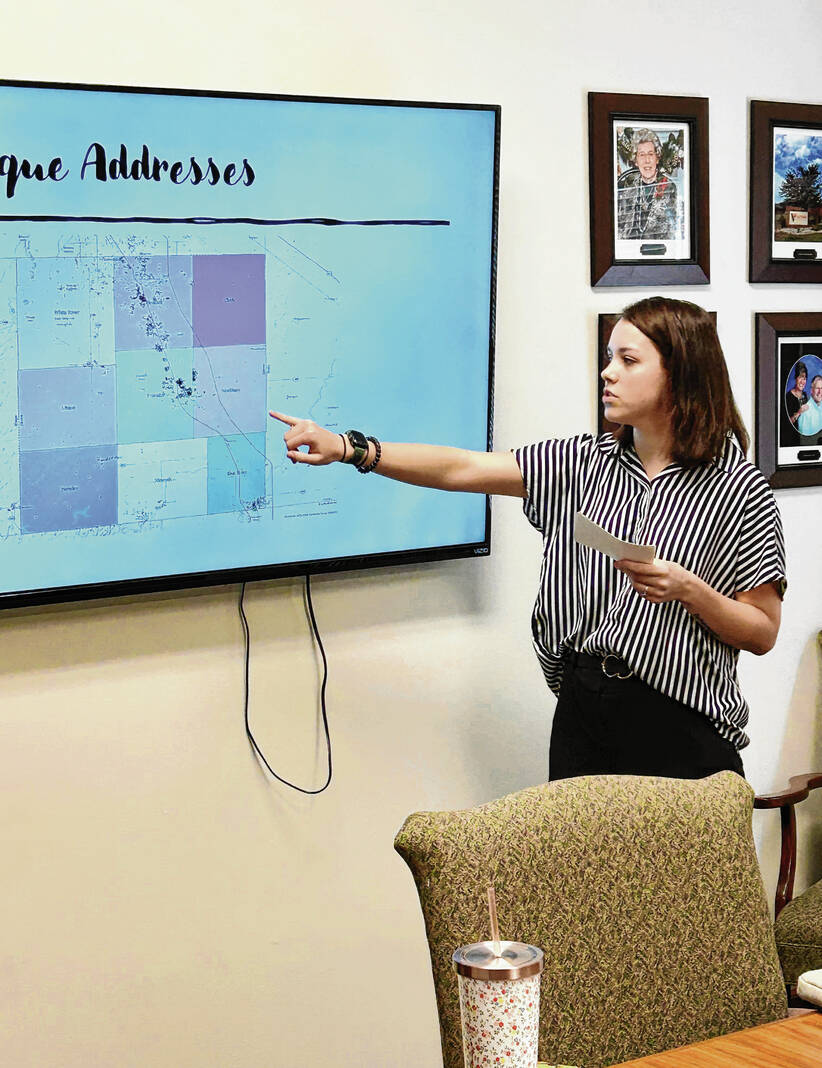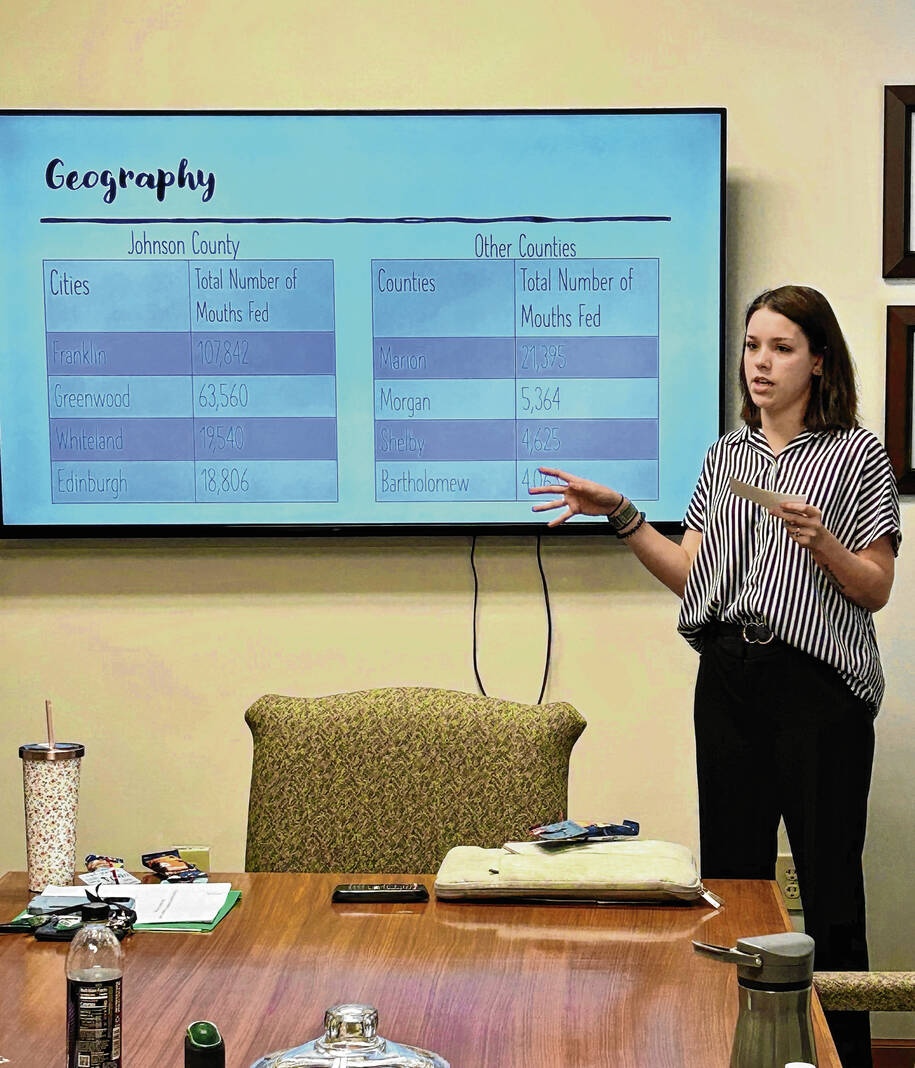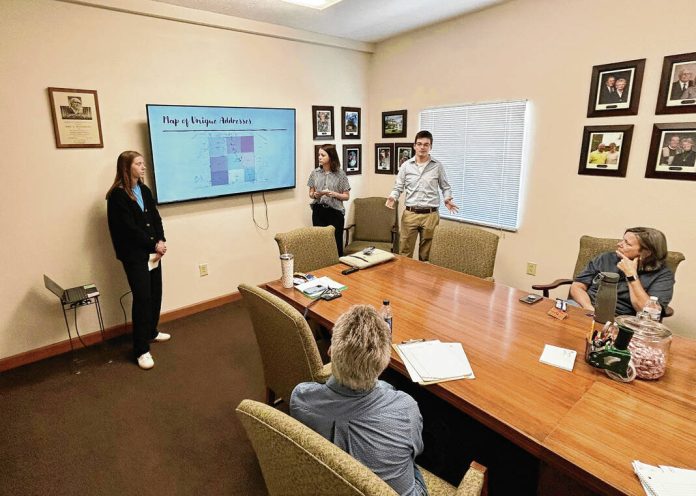
From right, Blake Talbert, Lilyanna Slaven and Dianna Rollag, all Franklin College students, give a presentation to Interchurch Food Pantry leaders on April 26 at the food pantry as part of the college’s Statistical Consulting Project course. RYAN TRARES | DAILY JOURNAL
The numbers and data had been piling up.
Leaders with the Interchurch Food Pantry had gathered reams of information on the families coming to get food, where they came from, how many were repeat customers, what kind of need was out there.
But in the crush of running a nonprofit, they didn’t have time to analyze what it all meant.
Enter a class of Franklin College students to help.
“In my work summarizing the data, a key takeaway was that the Interchurch Food Pantry touches so many lives in different parts of our community. Food need has no address, it doesn’t only reside in one neighborhood, it is in our community whether you see it or not,” said Blake Talbert, a senior data science and computer science major at the college, in an email.
Talbert is one of 21 students taking Statistical Consulting Project, a semester-long course at Franklin College pairing teams of students with nonprofits and community groups to complete consulting projects built around statistics. The students are responsible for meeting with participating groups, determining what their needs are for the project, then crunching the numbers to provide meaningful analysis to the raw data they’ve collected.
This semester, the students have helped the Humane Society of Johnson County make the case for a low-cost spay and neutering service, in addition to assisting the Town of Edinburgh with its comprehensive plan. For the City of Franklin, students have compiled a comprehensive list of businesses in the city and how many employees they have.
“It’s been a flagship course for our department, which really sets our kids apart,” said Dan Callon, professor of mathematics at the college.
The course not only provides students with tangible, real-world experience using statistics in consulting projects, but aids nonprofits and governments to better serve the community around them.
“Franklin College does a great job partnering with the community to benefit both students through hands-on projects and community organizations with valuable insights,” said Carol Phipps, executive director of the Interchurch Food Pantry. “A big thank you to them.”
The course was created by Callon in 2002, with the idea to give students a chance to apply statistics in addition to helping area nonprofits, as Franklin College offers the services for free.
“There’s a huge need. Nonprofits typically have a ton of data, or they need data for grant reports, things like that, and don’t necessarily have the expertise to get it,” Callon said. “And most nonprofits are getting by with too little funding and too few bodies, so they don’t have the time to do this.”
Students learn in the second week of the course who their teammates are, and which organization they’ll be working for. Early on in the semester, each team meets with their clients twice — once to gain an idea about the needs of the organization, then again to follow up with any questions and finalize details.
They are required to submit a project proposal, outlining what the client needs and the time schedule of what they’ll complete.
At the close of the project, they then present it before the organization.
While Callon has steered the course throughout its history, this year he enlisted another mathematics professor, Stacy Hoehn, to help. They have lined up a team of advisory members to offer their expertise as well.
The class meets with Tom Patz, the college’s assistant vice president of physical facilities, to teach students about project management. They also sit down with Winn Knight, who has taught courses at Franklin College in the past and worked elsewhere as a statistical consultant, to gain insight into the consultancy process.
Jeremy VanAndel, director of professional development for the college, speaks with the students on group dynamics and working with a client.
“There’s all of these great experiences and sources of knowledge that will help the students,” Callon said.
The course was cited by the Association of College and University Educators, which awarded the college the 2019 Award for an Exemplary Program or Achievement in a Mathematics Department, as a model for 21st-century career skills preparation.
More importantly, Callon has heard from countless alumni about how important the experience was in their education.
“Our students get back to us and say what a huge thing this was for them — how it was probably one of the biggest things in their professional development. Because you don’t always get to take what you learned in a class and put it into practice, where it makes a difference,” he said.
Though housed within the mathematics department, the only prerequisite to take the course is a basic applied statistics course. Students of all majors — from business to political science to music — have migrated to it in hopes of applying statistical skills in real-world situations.
Lilyanna Slaven, a junior majoring in marketing and management, was encouraged to sign up for the course as it met degree requirements in addition to working with nonprofits. Earlier in her Franklin College career, she had hoped to add a nonprofit minor, but the course load didn’t line up.
This was an opportunity to gain experience in that world, she said.
“This course provided me with a great start. Along with networking and furthering my data analysis skills, I knew that the project would help my heart, as my team and I were working for such a wonderful cause,” she said in an email.
For Talbert, the course helped meet Franklin College’s civic learning exploratory requirement, which empowers students to do work supporting the community. The class also synced perfectly with his data science major as it combined public service with statistical analysis.
An added bonus was having the chance to work with students from a broad area of study.
“I have been wanting to do volunteer work during college, so this helped me achieve that goal and get class credit. It also gave the opportunity to work in a self-organized team of diverse majors; our team consisted of a data science major, a business major, and a sociology major,” he said. “It was a great opportunity to get to do volunteer work at a professional level for class credit with a talented group of students who I would have never met otherwise.”
Students are assisting seven organizations this year. Five are located within Johnson County: Interchurch Food Pantry, Resources of Hope, Humane Society of Johnson County, City of Franklin and Town of Edinburgh.
In addition, the college is working with two groups located in Indianapolis whose services benefit Johnson County residents. The Indiana Youth Institute aims to improve the lives of Indiana children throughout the state by connecting people, organizations and communities helping kids.
Students are also working with Down Syndrome Indiana, which offers a variety of programs to enhance the lives of individuals with Down syndrome. Project participants have sent out a survey to families who the organization helps to gain a sense of what future services they should focus on.
“Down Syndrome Indiana is a 501(c)3 not-for-profit and we pour our heart and funds into our community. With that in mind, we often do not have additional funds to help with projects such as this one,” Dr. Macy Pohl, executive director. “Having a data team skilled in developing surveys and uncovering data trends not only can help us grow and thrive as a not-for-profit, but we are also able to plan for our future and how to best support our community in the future.”
Final presentations started last week, and continued this week as students close out their semester. On April 26, Talbert, Slaven and fellow student Dianna Rollag met with Phipps and other leaders with Interchurch Food Pantry to outline their findings. Food pantry leaders had provided the students with data on visits from clients, using client ID numbers rather than names to maintain privacy.
They broke down where clients to the food pantry had come from, presenting figures and maps to showcase where people come from throughout the county, the frequency of visits and unique clients vs. repeat clients.
The data was enlightening, Phipps said.
“All this helps as we make operational decisions such as how to better serve different areas across the county and whether to adjust our operating days,” she said.
The students found the opportunity to be just as valuable.
“My experience with the Interchurch Food Pantry of Johnson County throughout this course has been absolutely inspiring. The class itself helped to expand my team working, data analysis, and time management skills. I was super lucky to be paired with great teammates and such a wonderful cause,” Slaven said.
With their project completed, Talbert is enthusiastic about the skills he’s developed over the course of the project.
“The statistical consulting class has taught me how statistical consulting is performed and has opened my eyes to the importance of information-driven decision-making, especially in non-profits,” he said. “The class has also taught me how to work in a group with diverse skill sets, and by recognizing our own strengths and weaknesses we were able to maximize our efforts. These communication and planning skills are exactly what employers need.”


